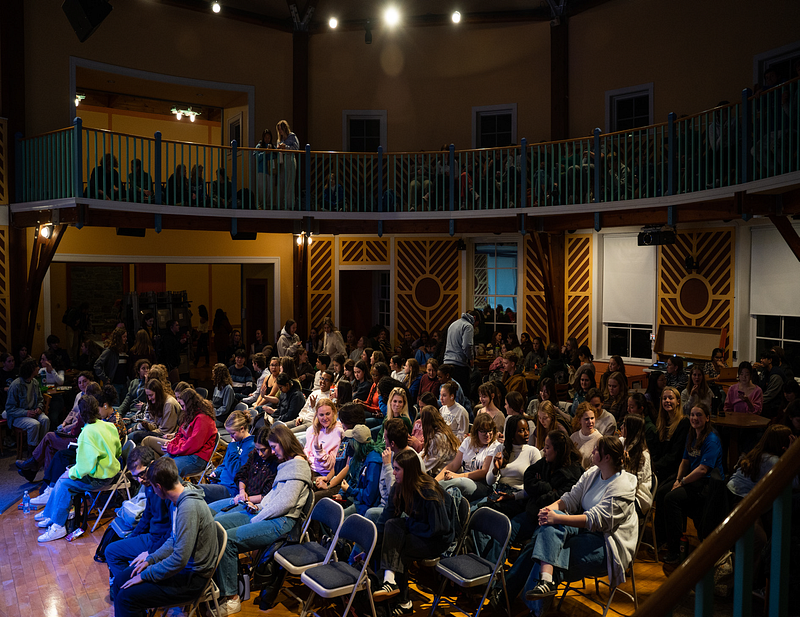
For the first few seconds after the comedian Mekki Leeper took the stage Tuesday night at the Events Barn, I briefly assumed he was another student — a member of CAB on stage to adjust the microphone or test the sound. But no. Comedian, actor, and writer Mekki Leeper, who has performed stand-up on “The Late Late Show,” written for the 2017 White House Correspondents’ Dinner, acts in the dramedy
The Sex Lives of College Girls
and the sitcom
Jury Duty
and whose Comedy Central stand-up routine has garnered nearly eight million views on Youtube, simply conveys a certain casual, self-effacing, down-to-earth energy which also infuses his stand-up.
Leeper started off the night with what he called “a loose Q&A vibe” — a mixture of crowd work and Hamilton-specific jokes. He earned a big laugh from the crowd — the Events Barn was packed wall-to-wall — when he lamented Hamilton’s four-hour distance from nearly every major city. Hamilton is like “a scientifically pinpointed spot that no-one would ever go to,” he said.
When the lights dimmed, a few minutes into Leeper’s set, the vibes, as he said, changed, and the comedian began delving into more personal anecdotes. Leeper is American-Moroccan but white-presenting. Where he grew up in rural Pennsylvania, nobody knew how to pronounce his Muslim/Moroccan name. “Does anyone have a weird name that people mess up a lot?” he asked the audience. Silence. “Okay, everyone is named Dave and Chris, and that’s nice.” When an audience member offered their own “weird” name, frequently mispronounced, he commiserated: “If it’s like, over the phone, they’ll put some crazy sauce on my name. But then when they see me, it’s like, surely it’s Mickey, I know it’s Mickey.” Leeper is cavalier about the racism he’s experienced — the parts of his identity he’s had to hide or obscure to evade bigotry. But his stories also serve as commentary on an American identity and American racism. “I tried to really play it cool, you know what I mean? I was like, I’m gonna own my name. I was in elementary school, I was like, my name’s Mekki, I’m Moroccan, and then 9/11 happened, and I was like, my name’s Tyler. I’m from Tyler, it’s a small part of Canada?”
Like many great comics, Leeper mines humor from personal difficulty, transforming emotional duress or distress into a self-deprecating candor reminiscent of late-night chats with friends. He related anecdotes about his fractured family; his parents divorced after Leeper’s mother discovered his father had been cheating on her for decades. The crowd oohed. “I know. This is the juicy part of the show,” he said. “I probably should have seen this coming, right? Cuz I have like, a cool dad [. . .] He like, took care of himself, y’know. He really worked out a lot, he was well-read [. . .] I hate to break it to you, but if your dad is tan, he’s up to something. D’you know what I mean? If your parents have been married for thirty years, your dad better look exactly like Paul Giamatti, okay? Any time I see like a fifty year old dude at the gym now, I just want to like shove him off the elliptical and be like, ‘Your family has a right to know what’s going on, man!’”
The past decade has ushered in a new era of mental-health awareness, but it’s also given rise to a type of sanitized, therapy-speak inauthenticity which can feel dismissive and prescriptive. Leeper is refreshingly transparent about his own struggles with mental illness, incorporating non-anodyne anecdotes on therapy and the suicide hotline into his set. On his therapist: “She’s like, some of the most creative people in the world have bipolar depression. And when you google that, the first two results are Amy Winehouse and Kanye West. I don’t know if I want to be that creative, actually. That feels a little too creative, I think.” On calling the suicide hotline: “At the end of one of these calls, the lady was like, you know, for non-emergencies — woah! Why’re we bringing that up, I don’t even know about that. I only call for emergencies, like this right now. She’s like, in California, we have something called a suicide warm-line. What the f**k is a suicide warmline [. . .] Like, I live in LA, I understand I’m not hot enough to be a model or an influencer, but, it’s like, you’re telling me I’m not hot enough for the suicide hotline [. . .] Is there a homicide warmline, I’m starting to warm up to that a little bit, right now.”
Leeper’s set is elastic and flowing, attuned to the specificities of his audience, and his jokes are replete with incisive wit and keen social commentary. Yet the most impressive part of Leeper’s routine is his cultivation of a sense of solidarity between himself and the audience: he’s just like us. We’re young, dumb, anxious, full of self-doubt and uncertain about the complicated, ridiculous world we live in. If anyone can testify to that, it’s somebody young, but also somebody who possesses enough accumulated hindsight to look back on his own unpleasant experiences and transmute them into communal enjoyment.
















